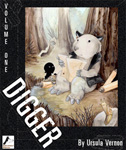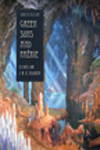Mythopoeic Awards
Acceptance Remarks - 2013
2013 Mythopoeic Fantasy Award for Adult Literature
Ursula Vernon, Digger, Vols.1-6 I want to thank the Mythopoeic Society for having been so kind as to nominate Digger, my extremely patient
publisher Sofawolf for having provided copies, and the judges for having made what was, for me, a wildly
unexpected decision! I am sorry that I can’t be here to thank you all personally, but please know just how
surprised and grateful I am.
I want to thank the Mythopoeic Society for having been so kind as to nominate Digger, my extremely patient
publisher Sofawolf for having provided copies, and the judges for having made what was, for me, a wildly
unexpected decision! I am sorry that I can’t be here to thank you all personally, but please know just how
surprised and grateful I am.When I was quite young, my mother got me a boxed set of the Narnia books by C.S. Lewis. I couldn’t pronounce “Narnia” but that didn’t stop me from reading the series until the bindings came unglued. These books were not like anything else I’d read, and they mattered in a way that most of the books in the school library didn'’t. They made me want to write books with Talking Beasts in them. (My mother tried to explain copyright and plagiarism and that I couldn’t actually call them Talking Beasts. She suggested “Verbal Varmints” as an alternate. I recall being unamused.)
When I re-read the series as an adult, I remember being astonished at how short the books really are. When I was a child they were so much longer. There were whole scenes and histories in there that I’d only imagined or dreamed or invented inside my own head and attributed to Narnia.
The very best fantasy, I think, has this ability, to be larger on the inside, to be bigger than the sum of the words on the page. We look through the gaps between the sentences and we see a completely different landscape. As with so many things we love as kids, my feelings about Narnia now are sometimes mixed, but you know, many years later, I did wind up writing a story about a Talking Beast—Digger the wombat—and to have it be so honored, by a society that knows all about books that are larger on the inside, is truly extraordinary. Thank you all, so very much.

2013 Mythopoeic Fantasy Award for Children’s Literature
Sarah Beth Durst, Vessel When I was little, I never thought there were monsters in my closet. The monsters were all under the bed, along
with the venomous snakes. The closet was for Narnia. I used to check it every single night, pushing aside all
the clothes, digging through the shoes and stuffed animals, looking for a way to the woods with the lone
lamppost. Winning this award makes me feel like I found the way into Narnia. I am so honored and so delighted,
and I know my ten-year-old self would be too.
When I was little, I never thought there were monsters in my closet. The monsters were all under the bed, along
with the venomous snakes. The closet was for Narnia. I used to check it every single night, pushing aside all
the clothes, digging through the shoes and stuffed animals, looking for a way to the woods with the lone
lamppost. Winning this award makes me feel like I found the way into Narnia. I am so honored and so delighted,
and I know my ten-year-old self would be too.I’ve wanted to be a writer since I was that ten-year-old girl. I believed—and still believe—that being a writer is the closest you can get in this world to being a wizard. You’re trying to cast a spell that lets you touch the minds and hearts of people you’ll never meet. You’re trying to transport people out of their lives and take them on a journey and then bring them safely back, maybe a little changed.
I love the journeys that you find in fantasy books. I love the way that fantasy is (or can be) a literature of hope and empowerment. When I close a fantasy book, I feel as though the world is a little more magical, a little more wonderful, and a little larger than it was before.
I write fantasy because, quite simply, it is what I love to read. After I received the news that Vessel had been nominated for this award, I looked at the full list of nominees and winners of the Mythopoeic Award since its inception. It’s a list of every author that I’ve ever loved. I started crying when I realized my name would be on that list of wizards.
So I want to say thank you from the bottom of my heart to the Mythopoeic Society, to my fabulous agent Andrea Somberg who has believed in me from the beginning, to my wonderful editor Karen Wojtyla at McElderry and all the other fantastic people at Simon & Schuster who helped bring Vessel into the world. And especially thanks to my family, my children who are my world, and my amazing husband Adam who made my dream his dream and who shares every step of every journey with me.
I wish I could go back in time and tell my ten-year-old self, “Keep looking in that closet for Narnia because, someday, you’ll find your Aslan. Or, more accurately, in the case of this beautiful award ... he’ll find you.” Thank you so very, very much!

2013 Mythopoeic Scholarship Award for Inklings Studies
Verlyn Flieger, Green Suns and Faërie: Essays on J.R.R. Tolkien My total surprise at being given the Mythopoeic Award for Inklings Studies quite literally left me speechless.
I must have said something besides “Thank you,” yet that is all I remember. I'll try to do better now.
My total surprise at being given the Mythopoeic Award for Inklings Studies quite literally left me speechless.
I must have said something besides “Thank you,” yet that is all I remember. I'll try to do better now.This award means a lot. It carries the affirmation of my peers in a field in which I have spent my professional life. It puts a stamp of approval on my work by folks who know what they’re talking about. It also puts me in some pretty illustrious company. Most of all, it gives me a standard to live up to. My Lion is sitting on my desk as I write, acting as bookend to my most often read Tolkien books, and looking benevolently but sternly at me, as if to say, “Yes, yes. That’s all well and good. So what are you going to do now?” He is a reminder that the work is never finished; there's always more to discover about Tolkien.

2013 Mythopoeic Award for Myth and Fantasy Studies
Nancy Marie Brown, Song of the Vikings: Snorri and the Making of Norse Myths I am honored to be awarded the 2013 Mythopoeic Scholarship Award for Myth and Fantasy Studies for my book, Song
of the Vikings. This biography of a 13th-century Icelandic chieftain has a long back-story, one that I think
will resonate with my fellow members of the Mythopoeic Society. It begins when I was about four years old and
my babysitter read aloud The Hobbit. I discovered The Lord of the Rings when I was thirteen. Through my college
days, Tolkien was my favorite author—in spite of the scorn such a confession brought down on an English major
at an American university in the late 1970s, where fantasy was derided as “escapist.”
I am honored to be awarded the 2013 Mythopoeic Scholarship Award for Myth and Fantasy Studies for my book, Song
of the Vikings. This biography of a 13th-century Icelandic chieftain has a long back-story, one that I think
will resonate with my fellow members of the Mythopoeic Society. It begins when I was about four years old and
my babysitter read aloud The Hobbit. I discovered The Lord of the Rings when I was thirteen. Through my college
days, Tolkien was my favorite author—in spite of the scorn such a confession brought down on an English major
at an American university in the late 1970s, where fantasy was derided as “escapist.” Then in a course on comparative mythology I was assigned The Prose Edda by Snorri Sturluson. Page 41 in Jean Young’s 1954 translation was the turning point of my literary life. I read: “The gods seated themselves on their thrones and held counsel, and remembered how dwarfs had quickened in the earth. ... By the decree of the gods they acquired human understanding and the appearance of men, although they lived in the earth and in rocks. Modsognir was the most famous, and next to him Durin.” Durin? I knew that name. In the list of dwarfs that filled the rest of page 41 and spilled onto 42, I recognized several more: Bifur, Bafur, Bombor, Nori, Ori, Oin, and ... Gandalf! What was Tolkien’s wizard doing in medieval Iceland?
I read Humphrey Carpenter’s biography of Tolkien, which had been published the year before, and learned about the Kolbítar. Intrigued, I found a professor who had a bookcase full of Icelandic sagas that he lent me, one after the next. When I ran out of translations, I found another professor to teach me Old Norse. I went to Iceland and, like William Morris and many other writers before me, traveled by horseback through the wind-riven wilderness to the last homely house.
The name of the wizard Gandalf Tolkien had plucked from Snorri’s list of dwarfs. But Gandalf’s character, Tolkien wrote, was “Odinic.” He derived from Snorri’s tales of the Norse god Odin, the one-eyed wanderer, the shaman and shapeshifter, the poet with his beard and his staff and his wide-brimmed floppy hat, his vast store of riddles and runes and ancient lore, his entertaining after-supper tales, his super-swift horse, his magical arts, and his ability to converse with birds. (The fireworks and the pipe-smoking were wholly Tolkien’s own.) So who was Snorri Sturluson? It took me thirty years after meeting Snorri’s Gandalf on the page before I thought to answer that question. Interviewed about Song of the Vikings for an Icelandic newspaper, I summed up my approach this way: Snorri Sturluson was the Tolkien of his time.
Receiving this award from a society of like-minded individuals completes a wonderful circle of inspiration. Thank you.
